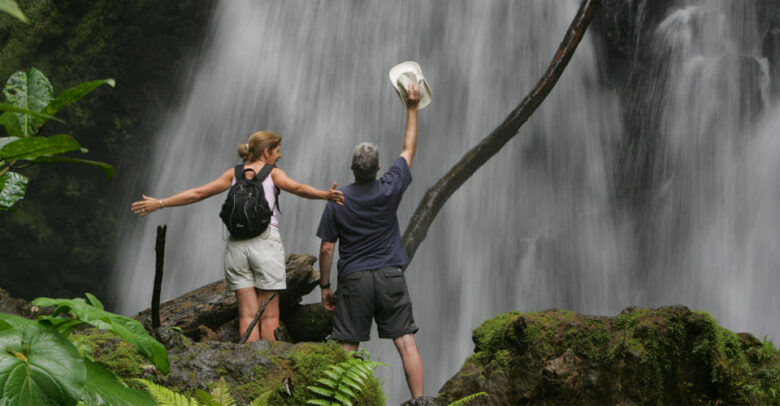Ecotourism focuses on supporting local communities and encouraging sustainable practices. This may involve providing visitors with educational materials related to environmental awareness, supporting local businesses, and celebrating cultural traditions. Economic incentives provide another important motivation for conserving natural resources, protecting endangered wildlife species while encouraging conservation efforts, and conserving natural habitats. Activities may include reforestation and habitat restoration.
1. Trekking
Trekking is a beloved tradition among eco-travelers, offering them an opportunity to connect with nature while leaving a positive mark on destinations they visit. Trekking also supports wildlife conservation programs like those run by Wolf Conservation Center programs in New York State.
Environment can help boost self-esteem. Multiple studies have demonstrated the positive effects of outdoor exercise for mental well-being. As you trek, be mindful to follow the “Leave No Trace” principles. Be sure to pack out all trash and refrain from picking flowers or collecting environmental souvenirs; alternatively, you could support local parks and nature areas by making a donation.
2. Cycling
Ecotourism practices encourage visitors to explore natural areas while limiting their impact on the environment and respecting local cultures. Transportation that promotes eco-friendliness can include public transit systems to lower carbon emissions or guided cycling tours through national parks.
Wildlife safaris are an ecotourism activity that allows participants to observe animals in their natural environments, participate in anti-poaching patrols, plant trees, and restore our planet’s green lungs—something anyone can do!
3. Hiking
Hiking is one of the world’s favorite eco-friendly activities and provides an incredible physical and psychological challenge, delighting both body and mind alike. Exploring nature’s splendor leaves lasting memories behind. But be sure to hike responsibly!
Hikes offer a wonderful way to discover forests, mountains, and coastal pathways while supporting conservation efforts in your local community. However, it is essential that hikers adhere to trail rules to protect wildlife without disturbing their natural behaviors or disrupting them in any way. If you’re seeking an experience that offers more challenge, consider an overnight hike. Though this trip requires camping gear, it can provide an incredible way to connect with nature and enjoy an authentic wilderness adventure.
4. Birdwatching
Birding is a relaxing activity that helps develop a greater appreciation of nature. Our planet’s thousands of species of birds provide us with the chance to learn about the ecosystems they inhabit, while their voices, plumage patterns, colors, and antics help us understand the relationships between living things and nonliving things.
Birdwatching can also contribute to conservation. By recording their sightings, birders can help scientists track wildlife movements and assess environmental threats. Other ecotourism activities that promote education include visiting historic landmarks and engaging with locals. Traveling this way can deepen your appreciation of a destination’s culture and history while supporting sustainable development efforts.
5. Cooking
Ecotourism involves visiting natural environments while leaving as little an environmental footprint as possible, such as by reducing energy usage, using sustainable travel practices, supporting local communities, or conserving and enhancing native flora and fauna.
One great way to do your part is through volunteering at a conservation project; not only will this aid the environment but also give you a unique experience and allow for deeper connections with nature. Stargazing is another eco-friendly activity, providing an opportunity to connect with the intricate earthly environments beneath that star-studded sky while leaving no footprint behind. Community gardens also play an essential part in supporting healthy ecosystems.
6. Yoga
Outdoor yoga practice provides an engaging way to connect with nature through mindful and healthy activity. Natural props like trees, boulders, and ridgelines can assist with poses. On your retreat, you may also participate in “forest bathing” (shirin-yoku). This practice helps reduce stress and anxiety levels—an invaluable benefit to our health and well-being.
Research has demonstrated that vacations that focus on nature lead to stronger pro-environmental behaviors. Furthermore, such trips often foster positive attitudes and experiences for visitors while contributing to local economies’ well-being economically.
7. Yoga Retreats
Eco-travelers can experience a spiritual adventure while exploring a new destination. Retreats specialize in cultivating mindfulness while building community spirit; many include outdoor yoga sessions amid picturesque landscapes or beach views as well as excursions or activities designed to promote sustainability and wellness.
Forest bathing (shinrin-yoku) and cultural tours are other activities that contribute to sustainable tourism, with forest bathing being one of the more relaxing forms. Shinrin-yoku immerses you in the tranquil environment of forests to promote mental well-being, while tours of sustainable farms connect you with their origins while supporting regenerative farming practices.
8. Surfing
Surfing is an activity that encourages participants to connect with nature while also connecting with themselves. As a sport that relies on delicate ecosystems for its existence, eco-conscious surf camps can help preserve these landscapes for future generations.
Surfing can also serve as an ecotourism activity that benefits local communities in numerous ways, including (1) promoting citizen science and awareness campaigns and (2) contributing to water safety and site preservation measures or organizing campaigns and community events for beach cleaning (Martin and Assenov 2014b); such actions may then help influence pro-environmental behavior changes among surf tourists (Towner 2018). Surfing truly makes for an eco-friendly experience!
9. Surfing Lessons
At its core, ecotourism involves exploring nature while leaving minimal impact behind. Activities like whale watching, snorkeling, and hiking make ecotourism ideal for environmentally conscious travelers.
Forest bathing (shinrin-yoku) is a beloved Japanese practice that connects you with nature while encouraging mindfulness. Ethical culinary adventures on sustainable farms provide another excellent opportunity to support regenerative agriculture while experiencing local cuisine firsthand. Surfing lessons offer you a fun, educational, and interactive way to ride the waves while forging a connection to the ocean. In addition, they promote active lifestyle choices—plus it’s just plain enjoyable!




